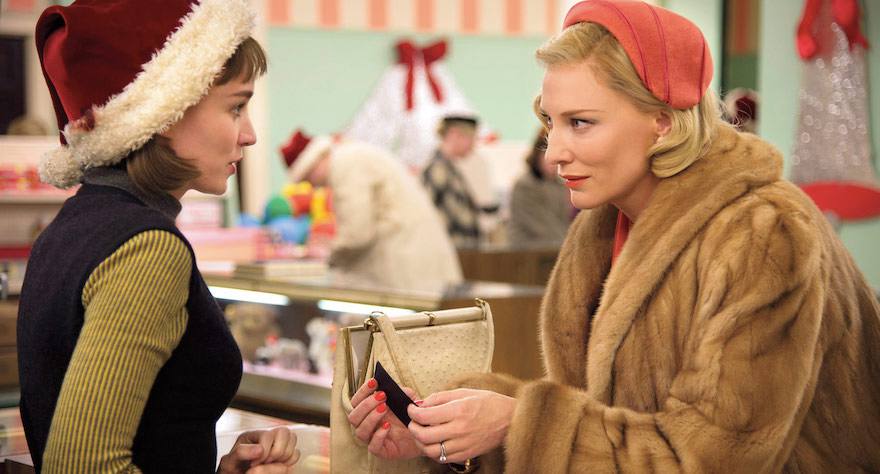
Exquisitely crafted and articulates the entrancing quality of falling for the right person.

Exquisitely crafted and articulates the entrancing quality of falling for the right person.
Todd Haynes’ gorgeous new film Carol is a delicate, romantic examination of queer identity in the 1950s. Based on the Patricia Highsmith’s novel “The Price of Salt”, about a virginal shop girl named Therese (Rooney Mara) who falls for the titular Carol (Cate Blanchett), this understated lesbian romance is an often joyous look at a blossoming relationship that transcends all obstacles of its era. Articulating that imperceptible pull of deep affection, Carol is wonderfully acted by its two leads. Mara and Blanchett develop an instant, intriguing chemistry that breaths life into their reserved initial exchanges. The immaculately crafted love story demonstrates the power of genuine connection, regardless of gender.
Haynes and his actors are able to express more with a lingering hand on a shoulder than most romances achieve in an entire film. Opening with a nervous dinner between Therese and Carol, the pair of women communicate an extensive mutual history without the benefit of the context that will later be added. Blanchett brings a dignified elegance to her fiery character, with a controlled outward demeanor Carol tries her hardest to maintain. To paraphrase a line from Carol’s jilted husband Harge (an excellent, but one-note Kyle Chandler), she’s always the most commanding presence in the room.
Her stoicism gives way when in the presence of her younger counterpart. It’s the radiant Rooney Mara who shines brightest in Carol, in spite of her character’s passive tendencies. The reserved manner in which Mara carries herself—burdened by the men and job that take her presence for granted – slowly gives way to reveal a girl simply unsure of herself. To Therese, Carol is more than someone to love, but someone whose self-assuredness is something to which she aspires (during their first get together, Therese admits she, “barely know[s] what to order for lunch”). To Carol, Therese is an alluring presence that needs to be coaxed out of her shell. Each actor seems charmed by the other’s quirks. It’s only in Carol’s presence that Therese learns to stick up for her own desires.
Carol shares thematic and temporal similarities to another Haynes film, 2002’s Far From Heaven, with the notable difference between being how retrospectively coy Far From Heaven seems by comparison. While Far From Heaven treats its homosexual elements as a reveal, Carol gives the gay relationship center stage throughout. No characters go so far as to use the L-word, G-word or H-word, but they are unrepentant about their “immoral” feelings. Therese and Carol have a harmonious bond. Even with Haynes’ history in making gay-centric movies (Poison, Velvet Goldmine), Carol feels like a step towards normalcy.
Carol could have simply been a story about a relationship falling victim to a bygone age. Instead, Haynes constructs a testament to love’s ability to endure. It’s a beautiful story only partly due to its unfettered handling of the lesbian relationship, but for the precision with which it portrays their romance. There’s a certain stiffness typically associated with Period Pieces—where costumes and era appropriate dialog gets in the way of character. That is never the case with Todd Haynes’ newest film, which uses time period as set dressing for a humanistic drama. The production details are flawless and immersive, but Haynes’ camera draws attention to his actors’ faces and their mindsets.
The culmination of Therese and Carol’s romance comes naturally. Haynes teases out the process until it seems as if the two are simply meant to get together, and that first blissful moment they share is exciting and moving. The film’s careful finale is Carol at its most tender, ending on a touchingly delightful note in sync with the rest of the film. It’s hope from the past to give us hope for our future.